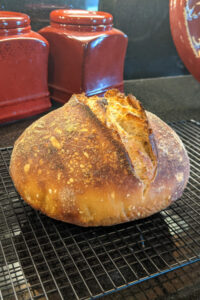I started baking bread about a year ago. At that time, I had pretty much cut bread out of my diet. I was convinced carbs were the enemy. But if that was indeed the case, carbs being the enemy, how come humans have been eating bread for thousands of years without adverse affects?
Then it hit me, maybe it had to do with the “modernization” of the process. If I could control the ingredients and the process, then maybe I could return to eating bread.
It’s amazing how simple the bread baking process is, yet how complex the outcomes are. A video I watched recently had a great quote about bread making that sums up the concept. A baker explained what captivated him about the process in four words:
“Four ingredients, infinite possibilities.“
Yes, that’s right, four simple ingredients – flour, water, salt, and yeast – can produce an endless number of results.
Over the past year, I’ve baked at least 100 loaves of bread, if not more. Each one has been different in its own way. Some loaves vary by a little, and others by a lot. Some loaves taste good, and others are outstanding. It’s amazing how the smallest changes in the ingredients, the environment, and the tools can affect big changes in the end result. I’m sure that’s what captivated me about the process.
From my experience, here are three pieces of advice for starting your own bread baking habit. These aren’t recipes. You can find plenty of those through a simple Google search. Consider these tips inspirational advice.
Do or do not, there is no try
If you’ve been thinking about baking bread, quit thinking. Stop researching. Get in the kitchen and start baking. Find what works for you and don’t be afraid to experiment. You might have a failure or two, and even an epic fail every now and then, but that’s how you’ll learn. Trust me, I’ve made my fair share of epic blunders. My baking has generally taken a big step forward after making one of my biggest blunders.
The tools matter
Invest in a good baking dish, either a bread pot or cast iron dutch oven. If I could point to one thing that changed my bread from mediocre to out of this world, my purchase of a bread pot was the difference. It was a bit pricey, but worth every penny in the results. Originally, I didn’t want to buy any specialized equipment to bake bread, but this is one thing I should have purchased from the start. I don’t want to go too deep into the details, but you need to bake your bread in a pot that will retain moisture since modern conventional ovens are designed to exhaust the humidity from an oven.
There isn’t a “right” way
Use articles, blog posts, books, and videos as places to get ideas and things to try, but don’t buy into one way of making bread. And therein lies the beauty of sourdough baking. It is four ingredients – flour, water, salt, and yeast – but the possible outcomes are infinite. Furthermore, there is so much dependent on your environment. Things like the temperature of your house, quality of water and flour, the altitude of your house, the relative humidity in your kitchen, your oven, how you shape it, how long you proof it, and the list goes on. Do you see my point? No one can tell you what will work best for you. You need to start with the basics and experiment from there to see what works best for you.
Yes, I’ve been bitten by the sourdough bread baking bug. After baking, and eating, over 100 loaves of bread, I haven’t noticed any adverse affects. I’ve introduced bread back into my diet. It’s been and continues to be a fun journey, and one I’m looking forward to continuing for a long time, a very long time.

